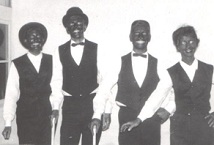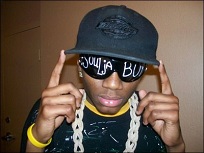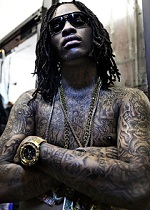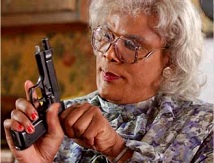Blackboy: America’s Minstrel Fascination [Editorial]
May 18 2011
 Burnt cork, fire red lipstick, a trashy wig or two, and a pair of white gloves. On their own, these items bear little to no significance, but when they are combined, they become the face of an era that systematically disparaged an entire people. The traditional minstrel show that dominated American pop culture for so long relied on its use of lazy and ignorant caricatures based on African Americans. Wielding watermelons and pork, these “black buffoons” were racially stereotyped characters built from longstanding feelings of fear and hatred. White actors, and in some cases black actors, donned the customary black face attire and took part in comedic musical skits meant to entertain largely white audiences. That’s not to say that the black community did not actively participate. While it may seem confusing as to why anyone would condone these actions, let alone the very people it targeted, it is important to remember that these were different times, and conformity was a must. Thankfully, a rise in black activism and civil rights movements led to the demise of such entertainment. Or so we would like to think. True, we are no longer in the “black face” era that dominated the American lifestyle for so long. We don’t see a rise in slave spirituals climbing up the pop charts, and we don’t exactly use the “darkie” caricature to market new products. Still there is a certain uncomfortable feeling that seeps through our current pop culture fascinations. A rise in black entertainment has given way for many young black men and women to achieve great successful careers. To many this is a blessing, and deservedly so, but to what extent must they, and even we as a society, exercise a moral responsibility? When rappers like Soulja Boy or Waka Flocka Flame are parading in front of cameras, dancing, wearing outrageous outfits, or delivering the most brainless lyrics, it begs the question: Is this right? Certainly it would be tasteless to directly compare the old minstrel shows of years past and the modern day rap industry, but is it so wrong to think about the effect on the black community? When these intelligent young black men, who can deliver real creative art, instead decide to mindlessly dance in front of a camera for a dollar, does it cross anybody’s mind that it could be detrimental to the perception of a whole race? Hip hop isn’t the only guilty party. What do we make of Tyler Perry’s insistence to make every character in his films a stock stereotype? Even more, what do we make of the black community’s acceptance to these degrading exhibitions? There is no watermelon, red lip stick, or plantation backdrop in sight, but there is an irresponsible display of racially driven entertainment that is twisting the perception of African Americans. There is no soapbox needed for this one, just a closer look at the entertainment industry’s exploitation of a race.
Burnt cork, fire red lipstick, a trashy wig or two, and a pair of white gloves. On their own, these items bear little to no significance, but when they are combined, they become the face of an era that systematically disparaged an entire people. The traditional minstrel show that dominated American pop culture for so long relied on its use of lazy and ignorant caricatures based on African Americans. Wielding watermelons and pork, these “black buffoons” were racially stereotyped characters built from longstanding feelings of fear and hatred. White actors, and in some cases black actors, donned the customary black face attire and took part in comedic musical skits meant to entertain largely white audiences. That’s not to say that the black community did not actively participate. While it may seem confusing as to why anyone would condone these actions, let alone the very people it targeted, it is important to remember that these were different times, and conformity was a must. Thankfully, a rise in black activism and civil rights movements led to the demise of such entertainment. Or so we would like to think. True, we are no longer in the “black face” era that dominated the American lifestyle for so long. We don’t see a rise in slave spirituals climbing up the pop charts, and we don’t exactly use the “darkie” caricature to market new products. Still there is a certain uncomfortable feeling that seeps through our current pop culture fascinations. A rise in black entertainment has given way for many young black men and women to achieve great successful careers. To many this is a blessing, and deservedly so, but to what extent must they, and even we as a society, exercise a moral responsibility? When rappers like Soulja Boy or Waka Flocka Flame are parading in front of cameras, dancing, wearing outrageous outfits, or delivering the most brainless lyrics, it begs the question: Is this right? Certainly it would be tasteless to directly compare the old minstrel shows of years past and the modern day rap industry, but is it so wrong to think about the effect on the black community? When these intelligent young black men, who can deliver real creative art, instead decide to mindlessly dance in front of a camera for a dollar, does it cross anybody’s mind that it could be detrimental to the perception of a whole race? Hip hop isn’t the only guilty party. What do we make of Tyler Perry’s insistence to make every character in his films a stock stereotype? Even more, what do we make of the black community’s acceptance to these degrading exhibitions? There is no watermelon, red lip stick, or plantation backdrop in sight, but there is an irresponsible display of racially driven entertainment that is twisting the perception of African Americans. There is no soapbox needed for this one, just a closer look at the entertainment industry’s exploitation of a race.
 It’s been a few years since Soulja Boy first burst on to the mainstream rap scene, but the damage is still as fresh as ever. Armed with nursery rhyme flows and a dance craze that swept through high schools everywhere, Soulja Boy was practically an overnight success. At the time of his big break, Soulja Boy was (and really still is) criticized as the face of a new trend in hip hop that overlooked substance in favor of making quick bucks from the ring tone market. All hip hop purist arguments aside though, there was something that even more deeply menacing about Soulja Boy’s success. His little dance and act a fool routine quickly became replicated across the nation. Suddenly, every young black MC made up a ridiculous dance and a senseless song to match. YouTube and BET became flooded by the videos of black kids dancing in front of a camera for the masses. Watching these kids in saggy jeans and oversized clothing practically put on a jig was admittedly a little disturbing. Considering that theoretically the largest market for rap is with white suburban males, it’s interesting to note that these black kids were essentially tap dancing for white boys. For what? For a few dollars. This wasn’t just a black and white issue though. Fueling the craze, black teenage girls everywhere guaranteed the success of these records. After all, it’s just harmless fun, right? Well, it could be. In this particular case though, watching these kids dance back and forth and sing their simple songs was a little too close to watching a man in blackface play up the “sambo” act. All while white America was entertained. That’s all that matters, isn’t it?
It’s been a few years since Soulja Boy first burst on to the mainstream rap scene, but the damage is still as fresh as ever. Armed with nursery rhyme flows and a dance craze that swept through high schools everywhere, Soulja Boy was practically an overnight success. At the time of his big break, Soulja Boy was (and really still is) criticized as the face of a new trend in hip hop that overlooked substance in favor of making quick bucks from the ring tone market. All hip hop purist arguments aside though, there was something that even more deeply menacing about Soulja Boy’s success. His little dance and act a fool routine quickly became replicated across the nation. Suddenly, every young black MC made up a ridiculous dance and a senseless song to match. YouTube and BET became flooded by the videos of black kids dancing in front of a camera for the masses. Watching these kids in saggy jeans and oversized clothing practically put on a jig was admittedly a little disturbing. Considering that theoretically the largest market for rap is with white suburban males, it’s interesting to note that these black kids were essentially tap dancing for white boys. For what? For a few dollars. This wasn’t just a black and white issue though. Fueling the craze, black teenage girls everywhere guaranteed the success of these records. After all, it’s just harmless fun, right? Well, it could be. In this particular case though, watching these kids dance back and forth and sing their simple songs was a little too close to watching a man in blackface play up the “sambo” act. All while white America was entertained. That’s all that matters, isn’t it?
 It’s unfair to place the sole blame on Southern hip hop, but it’s just as hard to ignore their contributions to the problem. Rappers like Waka Flocka Flame have become major players all while glorifying the street life, and delivering the most mind numbing lyrics. This wave of “real” street hustle music perpetuates the idea of black men in the struggle turning to the drug trade for survival. Well, that might be true for some, but how about the rest of the black male population? Truly they can’t all be drug dealers. They’re not, but that’s not what America sees in these music videos. The white teenagers who download and eat up all of this music are under some misguided assumption that these “characters” portrayed in these albums are somehow passable for the entire African American race. The Waka Flocka’s and Gucci Mane’s of the world deserve their credit for making something of themselves through art form. They also deserve the criticism over their troubling lyrics, which lacking in any real substance at all, consist of nothing more than “Keep my dick hard, and keep me smoking/ You get pills free, shawty no joking”. No one is asking anyone to be a role model, but when white kids that live near cul de sacs are rocking “Trap” shirts, it might be time to re-examine the way you’ve put your own people out there.
It’s unfair to place the sole blame on Southern hip hop, but it’s just as hard to ignore their contributions to the problem. Rappers like Waka Flocka Flame have become major players all while glorifying the street life, and delivering the most mind numbing lyrics. This wave of “real” street hustle music perpetuates the idea of black men in the struggle turning to the drug trade for survival. Well, that might be true for some, but how about the rest of the black male population? Truly they can’t all be drug dealers. They’re not, but that’s not what America sees in these music videos. The white teenagers who download and eat up all of this music are under some misguided assumption that these “characters” portrayed in these albums are somehow passable for the entire African American race. The Waka Flocka’s and Gucci Mane’s of the world deserve their credit for making something of themselves through art form. They also deserve the criticism over their troubling lyrics, which lacking in any real substance at all, consist of nothing more than “Keep my dick hard, and keep me smoking/ You get pills free, shawty no joking”. No one is asking anyone to be a role model, but when white kids that live near cul de sacs are rocking “Trap” shirts, it might be time to re-examine the way you’ve put your own people out there.
 Becoming both a hero and villain to the public, Tyler Perry has risen to the top of Hollywood. As one of the most successful moviemakers in the country, Perry’s numerous movies and TV shows have made him a millionaire. His works, often based around black families and their inner conflicts, have grossed close to $400 million to date. Perry’s successful run as a black film maker, and his use of almost all black casts have made him a beacon of hope for many. His movies are almost exclusively targeted towards black audiences, and for the most part, that’s exactly who is paying for his products. While Perry may be attempting to positively portray African Americans, it’s his constant use of stereotypes and cartoon-like characters that have drawn criticism. His portrayal of ‘Madea’ as an insane, boisterous, and dysfunctional older black woman leave little room for actual depth. With Madea, Perry has constructed a monster stereotype of every black woman across America. So, who loves Madea the most? Black audiences. Black audiences everywhere continue to pay their hard earned money to watch Perry ridicule and embarrass the symbolic black mother figure. In this case, white America is not the guiltiest party. Instead, it’s the very community that Perry mocks in his films and sitcoms. Coupled with idiotic black male characters, Perry’s works walk a dangerous line between comedic satire and irresponsible storytelling. Funny enough, it’s hard to blame Perry. His movies with Madea are the highest grossing of all his works. What does that say about his audience? If a Tyler Perry play was taken out of the theater, had it’s name changed, and the actors were put in blackface….well, would you be able to tell the difference?
Becoming both a hero and villain to the public, Tyler Perry has risen to the top of Hollywood. As one of the most successful moviemakers in the country, Perry’s numerous movies and TV shows have made him a millionaire. His works, often based around black families and their inner conflicts, have grossed close to $400 million to date. Perry’s successful run as a black film maker, and his use of almost all black casts have made him a beacon of hope for many. His movies are almost exclusively targeted towards black audiences, and for the most part, that’s exactly who is paying for his products. While Perry may be attempting to positively portray African Americans, it’s his constant use of stereotypes and cartoon-like characters that have drawn criticism. His portrayal of ‘Madea’ as an insane, boisterous, and dysfunctional older black woman leave little room for actual depth. With Madea, Perry has constructed a monster stereotype of every black woman across America. So, who loves Madea the most? Black audiences. Black audiences everywhere continue to pay their hard earned money to watch Perry ridicule and embarrass the symbolic black mother figure. In this case, white America is not the guiltiest party. Instead, it’s the very community that Perry mocks in his films and sitcoms. Coupled with idiotic black male characters, Perry’s works walk a dangerous line between comedic satire and irresponsible storytelling. Funny enough, it’s hard to blame Perry. His movies with Madea are the highest grossing of all his works. What does that say about his audience? If a Tyler Perry play was taken out of the theater, had it’s name changed, and the actors were put in blackface….well, would you be able to tell the difference?
It’s scary to think about the way racial perception has evolved, and in some cases regressed in this country. A lot of it is our own doing. The minstrel traditions that once entertained an entire nation were hurtful, ignorant, and spiteful practices . After facing so many unbelievable challenges in this country, it’s hard to believe that any member of the black community would ever want to replicate even a hint of that. Yet, as controversial as it may be, as hurtful, negative, and crushing as it may be, black America continues to propel the success behind these institutions. We may not be plastering our cartoons with big red lipped, dark skinned maids anymore, but this certainly can’t be any better.
“Little whiteboys want to be me
but you don’t want to go through, what I go through…
true definition of a Blackboy”
-Victor Sandoval, Assistant Editor Strange Music
Follow Victor on Twitter: @VicMSandoval
